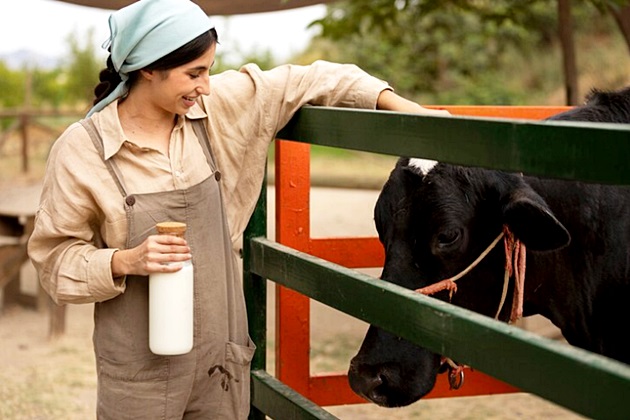1076

Israeli soldiers and farm volunteers are now required to wear bulletproof vests while feeding and milking cows on kibbutz farms attacked by Hamas.
Big losses
Normal operations on those farms are slowly returning, but many have suffered severe damage as well as loss of workers and livestock.
After a 5-day period of not being milked or fed, cows on farms in the restricted military zone are now fed, as trucks carrying feed are allowed to enter under armed military guard.
A farm was forced to let all its cows loose to fend for themselves because there was no food for them on the farm. Those cows still roam the kibbutz.
Dairy products from Israel
Israel is home to approximately 115,000 cows that produce approximately 1.6 billion liters of milk per year. There are 2 farming systems in Israel, including 164 kibbutz farms built around communities and another 573 larger private farms called moshav farms.
Kibbutz farms located 10 km from the Gaza border were attacked, many farm members were shot and killed.
Many of these slain workers are from Thailand, and the Thai government is now helping those who escaped to return home. This leaves a huge void of farm workers, but a movement is now underway to train volunteers who have traveled from all over Israel to help on the farms.
Sivan Lacker, founder of Israel's Mutual Dairy Farming, an organization that promotes cow welfare, said work on the farms has been slow but progress. "The dairy farms that were attacked are slowly recovering," she said.
After 5 days without food, they were able to bring in truckloads of feed for the cows. All this is done with military escort because it is still dangerous and rockets are still being sent daily by Hamas.
Volunteers on farms
"Cows are milked by volunteers from all over the country. Some have experience in dairy farming, but most do not. All directors and dairy staff who survived the attacks were evacuated to a safe area.
Lacker and one of the dairy farm managers created a training scheme to help teach volunteers about dairy farming. "My friend Sarit Yucker, who is a northern dairy farmer, and I decided to create a quick basic milking course for volunteers who want to learn before going south to work on farms," Lacker said.
“Some farms are throwing away milk as the tanks were damaged during the attack. A few farms are now able to send the milk to the factory for processing.”
The need for volunteers
Lacker added that volunteers are needed to keep the farms running. “Many of our Thai workers were killed. Those who survived escaped and the Thai government is helping them return to Thailand.
Some of the reports we receive from farms are heartwarming. A 19-year-old had previously worked on a kibbutz farm before joining the army. Once the farm was attacked, he went back to the farm and was the only one there and managed to do it all by himself."
Unfortunately, there are a number of cows that have starved to death. "Volunteers and the army are doing their best to manage the remaining cows and milk and feed them," she said.




